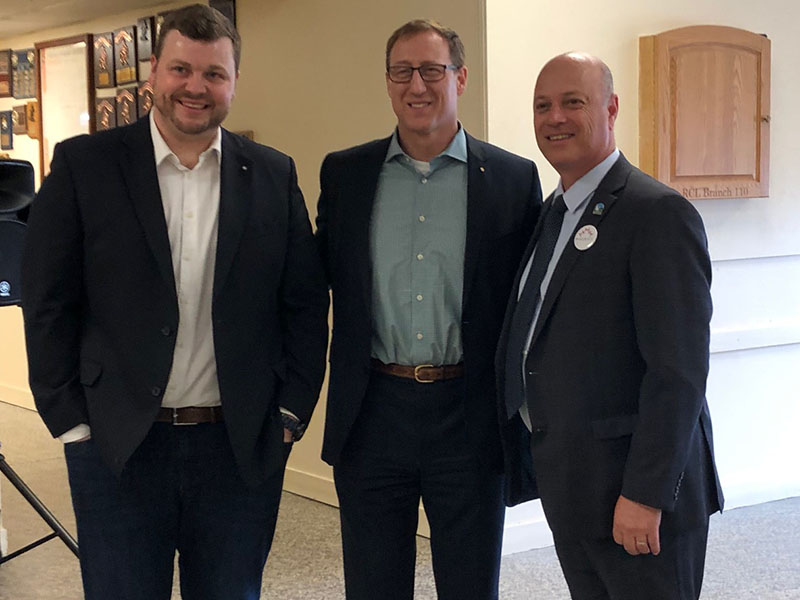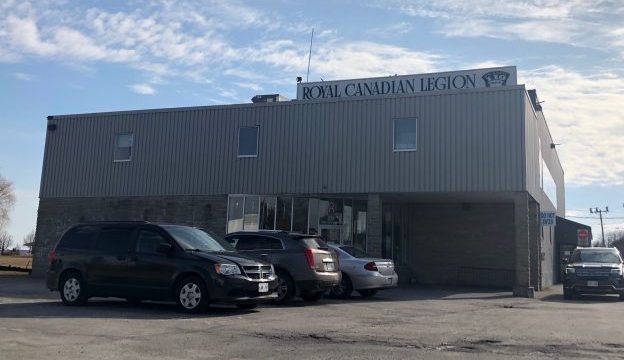Peter MacKay talks local issues during leadership campaign stop

Belleville mayor Mitch Panciuk (r) stopped by the Legion in Trenton to welcome Conservative leadership candidate Peter MacKay (c) along with former Bay of Quinte Conservative candidate Tim Durkin (l) Monday. Photo by Ryan Peddigrew
BELLEVILLE – A stronger message should have come from the prime minister during the recent rail blockade in Tyendinaga for more than two weeks, Conservative Party leader candidate Peter MacKay’s told a crowd at the legion in Trenton Monday.
MacKay was at the Royal Canadian Legion Branch 110 in Trenton Monday to talk shop with potential conservative voters as he campaigns to be the next leader of the Conservative Party of Canada.
The former defence minister criticized the Liberal government in reference to the recent situation in Tyendinaga for not acting sooner reacting to the protests. He cited the party’s lack of leadership and addressed how he would’ve handled the situation.
“I would have sent a clear signal from the top that the blockades had to come down. That was the position that the prime minister came to about two-and-a-half weeks into the issue. Keeping in mind that he was out of the country for the first ten days as well. Maybe that’s lightning-speed in the Liberal world,” said MacKay.
This was all part of a conversation between MacKay and Bay of Quinte Conservative MP candidate Tim Durkin in front of a crowd of around 50 people at the legion.
MacKay addressed a wide range of issues like the cancellation of moving the JTF2 task force to Trenton, climate change and carbon tax.

A small crowd gathered to hear Peter MacKay speak and have the opportunity to meet him afterwards. Photo by Ryan Peddigrew, QNet News
When MacKay served as defence minister from 2007 to 2013 he was a part of the decision to move the JTF2 task force from Dwyer Hill in Ottawa to CFB Trenton, a plan which has recently been cancelled by the current Liberal government. When asked if he would move JTF2 to Trenton as was originally planned, he said he would have to re-evaluate, seek military advice and see what changed.
MacKay also spoke about supporting military troops and veterans expressing support for service animals, medicinal cannabis, tele-health and tele-mental health.
Climate change was also on the agenda.
MacKay said that while Canada isn’t a big polluter, we still need to do our part. He put emphasis on home-grown green technologies and strongly opposed a carbon tax.
“Why wouldn’t we pay for the new green technologies that we’re developing in our country, share it with our first nations. Share it with and invest it with our innovators to grow that green economy. We need to get it to the coastlines to get it to the world,” MacKay said.
He also addressed some personal issues, explaining why he left politics.
MacKay said his young family and his mother falling ill played a role in him stepping away in 2016 to practice law. He said he’s back now because he feels he still has something to offer. He also referred to his years of experience in the cabinet as defence minister during years of recession, and his widely-known role in uniting what became the Conservative party of Canada.
MacKay was the leader of the Progressive Conservative Party and facilitated an amalgamation between his own party and Stephen Harper’s Canadian Alliance party. The result eventually led to two election victories of the Conservative Party under Harper.
MacKay is widely considered to be a leading candidate for the Conservative leadership to replace Andrew Scheer, according to recent polls.

People lined up after Peter MacKay spoke to get a picture and have a chat with the Conservative Party leadership candidate. Photo by Ryan Peddigrew, QNet News
MacKay faces seven other candidates including Hastings, Lennox and Addington MP Derek Sloan and Durham MP Erin O’Toole.
MacKay said he’s focused on meeting potential voters when he was asked about Alberta Premier Jason Kenney’s endorsement of O’Toole this week.
“Last I checked Mr. Kenney gets one vote,” he said, adding “I’m attempting to win this leadership person by person, group by group, going out and talking to members and potential members of the conservative party. I’ve worked with Jason in the past and I’ll work with him again when I become leader and prime minister of this country.”
The Conservatives will elect their new leader on June 27.
 Print This Post
Print This Post






